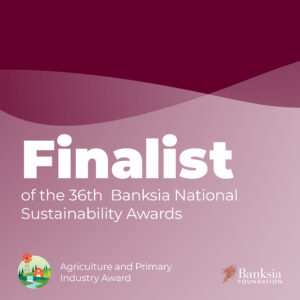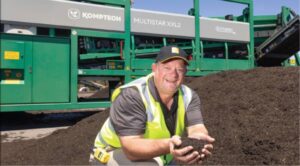Did you know that Australians waste four million tonnes of food annually at an estimated cost of over five million dollars?
In order combat some of this loss, the City of Bunbury, together with the shires of Harvey, Collie, Capel, Dardanup and Donnybrook-Balingup have joined together to recycle food and garden vegetation into beneficial soil improver and mulch, through controlled composting.
This has been made possible through the introduction of the new organics bins, which were recently delivered to all Bunbury households and some towns in the Shire of Capel.
This is the first regional initiative recycling food and garden organics in WA and will undoubtedly be watched closely as many Councils throughout the state move towards diverting organic waste from going to landfill.
The bins were introduced after a 2011 survey of waste practises in the Bunbury Wellington region showed 85% of local residents and businesses wanted more waste diverted from landfill, 80% believe it is important to process regionally and more than 75% supported the introduction of a third bin for organics.
Why is it important to recycle food and green garden wastes? According to the ‘Second Bite’ website 47% of municipal waste in landfill is food and green organics waste. Food waste in landfills is the second largest source of methane, a greenhouse gas that is 23 times more harmful than carbon dioxide emissions.
This initiative is a wonderful example of closing the loop, one of the fundamental ways of living a more sustainable life. I see this as a very important step in recycling some of the wastes that are most difficult to deal with into beneficial solutions to problems in our sandy soils. Specifically, its a way of placing organic carbon back into the soil. This living carbon is the powerhouse of soil bringing real fertility to some of the oldest, most depleted soils on the planet.
One of the greatest issues with any recycling project, particularly with food, is contamination with plastics and glass. Education is an essential driver of recycling efforts such as this and local government is implementing a large public education campaign. Waste Education Officer Darran Plumb said this information has to be taken into workplaces, schools,shopping centres, community events, pretty much anywhere people spend time.
There is an overwhelming desire to know more and to do the right thing on the part of householders. Early contamination results have been very promising. There is a sorting process where contaminants are removed by hand but, this is a very labour intensive and costly step.
The contents of the bins are taken to the Banksia Road composting facility near Dardanup, which is where the magic happens. A system called a Mobile Aerated Floor, or ‘MAF’, is used to break down the waste. Air is pulsed through the decomposing organic material, which activates microbes, fungi, and other organisms in the waste.
This leads to almost immediate increases in temperature, which can go as high as 80 degrees Celsius. While this is instrumental in breaking down the material, it also kills off weeds, seeds and pathogens including dieback disease. The ongoing composting activity converts organic wastes into a stable material that is high in humus, which has many beneficial attributes for improving soil and plant health.
Western Australian company, C-Wise of Nambeelup, just inland from Mandurah, supplied the equipment, expertise and training for the operators. They are the Australian distributor for this technology which is designed to achieve better process control and a smaller footprint than traditional windrow composting systems.
The capital, energy and fuel requirements are also considerably lower than other technologies and this provides an affordable organics recycling solution. These factors, combined with ongoing support and advice from a successful composting company convinced Council to go with the MAF system. In the end it was both the lowest cost and the lowest risk option.
In Bunbury the waste stockpile is built up over two weeks as material comes into the Dardanup facility. Then every fortnight the pile is relocated to another MAF blower unit. The movement from one unit to the next involves careful watering and mixing of the pile. After 8 weeks of forced air processing the composted material is allowed to cure, before it is ready to be used. The first Bunbury batch is still in process and once completed, testing of the products will then determine what specific use will be made of this new resource.
One of the early potential stumbling blocks to the project was the limited single phase rural power supply. An innovative power management system stores energy in batteries and converts this into a clean 3 phase power supply. The system can easily be connected to photovoltaic cells and use solar power in the future.
The lessons learned here can be taken to more remote sites where solar power could be used to run the plant. Being able to link up to solar power can also be of value in locations where the cost of supplying mains electricity is high.
Composting is not just a manufacturing process it’s also an art; the process needs careful monitoring and management as different ingredients and weather conditions need to be taken into account. The team at C-Wise have over 75 years of composting experience between them and are sharing this with the new team at Bunbury.
The MAF Composting System allows precise adjustment of the air going through the pile so that the composting process is under control, all the time. The continuous control of oxygen levels in the pile also means that there is no risk that the composting pile will smell when it is turned.
This forced air system is good news from an environmental viewpoint as it prevents the conversion of waste into methane gas. In addition the efficiency of the system means much reduced emissions from operations such as compost turning which is not needed. Also the system requires front end loaders to clock up fewer hours, saving money on fuel.
MAF Composting Systems are providing cost-effective organic waste recycling solutions, mainly in regional areas across Australia, where budget constraints restrict adoption of capital intensive alternative waste treatment plants. Being able to process waste in relatively small localised facilities means that the cost of transporting these materials, both in dollar and environmental terms, is considerably reduced. The recycling of organic wastes into a valuable soil amendment is of critical importance both for WA’s very poor soils and for the environment.
A growing community of ‘MAF’ compost producers (both local government and private operators) are sharing ideas and opportunities and producing some great products for sustainable farming, landscapes and home gardening.
Successful operations in NSW and Queensland have been trailblazers for the MAF technology on the Eastern seaboard and the Bunbury region is showing the lead in Western Australia.







